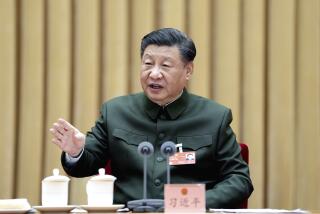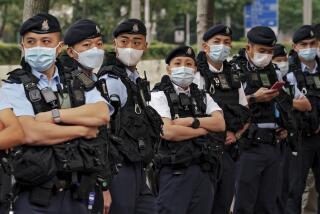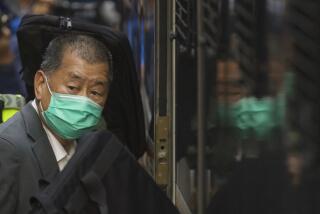China Claims It Will ‘Open’ Dissident’s Sedition Trial : Rights: It is unclear if Western media will see Wei Jingsheng face charges of trying to topple Communists.
- Share via
BEIJING — Celebrated Chinese dissident Wei Jingsheng--who has already spent much of his adult life in prison for criticizing the Communist leadership--will be tried Wednesday in Beijing for the capital crime of attempting to overthrow the government, court officials confirmed Monday.
Beijing court spokesman Chen Xiong said the trial will be open, and he accepted verbal requests from journalists to attend. “Public trials” in China, however, are generally by invitation only, attended by Communist Party officials, a handful of reporters from official media and members of the accused person’s immediate family.
It was still not clear Monday night whether foreign journalists will be allowed inside the court to hear Wei, 44, defend himself.
Beijing prosecutors have given few details of their case against Wei except that he is charged with sedition for attempting to overthrow the government. One source with a slight connection to the case said the government evidence includes a foreign passport.
Court spokesman Chen said Monday that Wei will not be allowed to have foreign counsel represent him at the trial. When the news of sedition charges against Wei first came out last month, eight internationally known lawyers, including former U.S. Attys. Gen. Nicholas Katzenbach and Richard L. Thornburgh, volunteered to represent him.
Wei’s sister, Wei Shanshan, who lives in Germany, said the family has contacted Beijing lawyer Zhang Sizhi, who has represented dissidents in previous cases, to represent her brother.
Meanwhile, the international human rights group Amnesty International has called for a demonstration outside the Chinese Embassy in Washington today to protest Wei’s detention and trial.
As it was in 1979, when he was first convicted on political charges of “incitement to overthrow the socialist system,” Wei’s main offense in the eyes of the government appears to be that he spoke critically of the Chinese regime to foreign reporters and wrote critical articles for foreign publications.
For example, in a January 1994 interview with the London Daily Telegraph, Wei touched a politically sensitive nerve when he spoke negatively about the prospects for the British-administered territory of Hong Kong after it falls under Chinese rule in July 1997. “There will be no victors after 1997,” Wei said. “The moment they try to extend their influence to the territory, talented people will flee and Hong Kong’s status as an international trade center will cease.”
*
In February 1994, Wei enraged Chinese officials by meeting with John Shattuck, U.S. assistant secretary for state for human rights, in a Beijing hotel room.
On April 1, 1994, after enjoying only about six months of freedom following a long prison term, Wei was stopped by police on a highway outside Beijing. He has not been seen in public since.
Wednesday will mark the second high-profile political trial for Wei since he burst on the scene in 1978 as a daring intellectual whose biting essays and big-character posters urging democratic political reforms figured prominently in the short-lived Democracy Wall Movement.
Wei’s nearly two decades as one of China’s most famous dissidents runs almost concurrently with the Deng Xiaoping leadership era in Chinese political history.
Wei, a former member of a militant Red Guard unit during the Cultural Revolution and the son of a Communist Party official, was one of the first people in China to publicly criticize Deng after he consolidated power in the late 1970s.
In 1979, Wei was charged with the “counterrevolutionary” crimes of betraying military secrets to foreigners and attempting to overthrow the socialist system with his magazine essays and posters.
After serving more than 14 years of a 15-year term--including long stints in remote prisons and work camps where he lost his teeth and endured periods of solitary confinement--Wei was released by the government in September 1993. The release was timed to enhance Beijing’s ultimately unsuccessful bid to host the 2000 Olympic Games.
More to Read
Sign up for Essential California
The most important California stories and recommendations in your inbox every morning.
You may occasionally receive promotional content from the Los Angeles Times.













